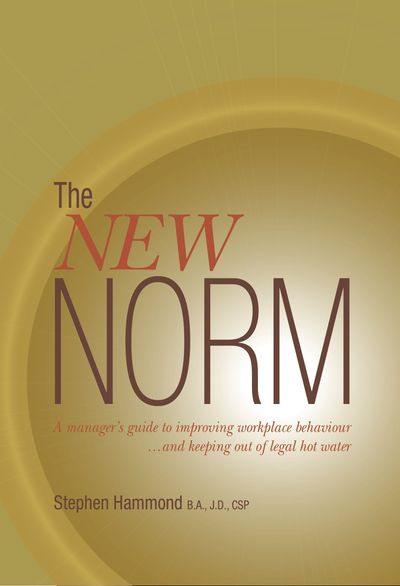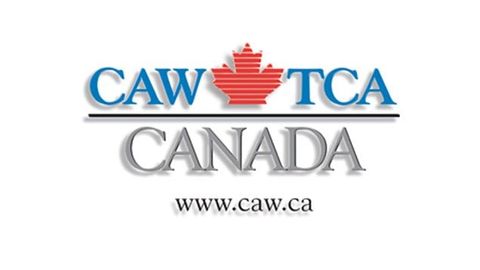Chapter twenty seven
THE NEW NORM uses emails wisely
Just yesterday I was talking to a friend who told me about an email exchange that went terribly wrong. His lengthy story seemed rather dramatic to me, so at risk of offending him, I interrupted to ask, “So what was the learning here?” He replied, “Next time, pick up the phone.” This next case may be an extreme example of such a lesson, but it drives home the point effectively.
Jay Rae was an elected union representative with the Canadian Auto Workers in Saskatchewan. In an email, he requested information from a manager at his workplace, DHL Express Canada. When Roy Eckmeier, DHL’s director of operations, asked for clarification as to why this information was needed, Rae sent a number of blistering emails, copying them to a wide variety of people.
He referred to Eckmeier and other managers as “puppets,” saying they were “full of shit,” “fucking liars” and “fucking stupid.” Eckmeier told the union’s national representative Rae’s behaviour was in violation of the collective agreement language on bullying and harassment.
DHL asked the union to resolve this matter and get a retraction and apology from Rae. The company also said another such incident would lead to Rae’s dismissal. When Rae responded with another disrespectful email, the company suspended him for thirty days without pay. His union grieved the suspension, claiming union officer protection.
It seems one or more of the employees at DHL could have learned a thing or two by taking my Respectful Workplace online course. He could have avoided a lot of problems for himself and the Union by learning the basics to avoid workplace harassment, bullying and a toxic workplace.
Before attending law school, I worked in human resources. Then, when I went back to university to study law, I worked part time in human resources. Some of my courses included labour relations, and after leaving the formal practice of law, I worked in labour relations.
Hence, I got to know my way around a bargaining table and understood some of the drama and rules of the “game” that involves coming to mutual agreements.
One of them is the need to let some inappropriate behaviours slide. When talking about pay and working conditions, some people can get very emotional, and I completely understand it. It’s not all an act, as this is about people’s livelihoods and desire to improve their lives.
As a result, sometimes you choose to put up with otherwise untenable behaviours because you understand that sometimes people have to blow off steam.
In Rae’s case, the union was making a valid argument that in the heat of bargaining, union officials are allowed a certain amount of immunity, to ensure that excitable comments made during bargaining and other negotiations don’t get held against people. Whereas the company said Rae’s derogatory comments were not made during a bargaining session or anything related. He was just being abusive.
To this point, the arbitrator wrote: “The limits of union officer protection did not extend to statements and conduct that harassed or ridiculed other employees, including management personnel. The grievor called management personnel liars and communicated that to other employees.
The competence of management personnel was called into question using stark and profane language. The emails overstepped the bounds of acceptable discourse and constituted insubordination and harassment. The grievor showed no remorse and did not admit, even at the hearing, that he had done anything wrong. The thirty-day suspension was appropriate given the escalation of the emails, their continuation over a period of days and their communication to a large number of people.”
What’s interesting about this case is how the company wasn’t “squeaky clean” in all its actions. The collective agreement has explicit language in which a “disciplinary hearing” must be conducted when discipline of this nature is given to an employee. In this case the company didn’t take that step, thereby potentially wrecking its chance of being firm about Rae’s abusive emails.
However, the arbitrator wrote, “There was a technical breach of the obligation to conduct a disciplinary interview but I find that it did not prejudice the Grievor in any material way and, therefore, does not affect the validity of the decision that was taken.”
There will be times where the behaviour is so bad, other technical transgressions may be excused to ensure similar behaviour isn’t repeated in the future. Just like social media, when we “send” an email, it’s out of our hands…and it’s that much worse when we purposely cc other people.
The OLD NORM
- uses (relatively) new technology to inflict his abuse on others.
- decides to make it worse by adding other people to the email trail, thereby ensuring there is no control over what is passed along to others.
- doesn’t take the time to breathe, settle down and think clearly before madly typing profanities in an email.
- continues to correspond with email as opposed to meeting the person face to face or on the phone.
The NEW NORM
- never sends an email that can be seen as inappropriate or abusive to others at work.
- if he knows he can be a hothead, institutes his own rule of waiting X number of minutes or hours before sending contentious emails.
- reads over emails before sending them, and if it seems like even one word might be taken the wrong way, changes it.
- picks up the phone when anything contentious may be in play.
Suggestions for the New Norm:
01
Educate employees about the proper use of emails. This relatively new form of communication has got many people into trouble. Don’t assume new or long-term employees know basic email etiquette. There are plenty of simple courses on proper email use, including online. Or a quick scan of the internet will reveal loads of articles about proper email use. Simple education can solve a lot of problems.
02
Email is a different form of communication. By rights, we should think of email as one of many options for communicating with others. However, what’s very different is how quickly a bad email can get around. Just like social media, if someone says something bad about someone or to someone in an email, the damage can be so much worse than harsh words said face to face. Once it leaves a person’s electronic device, the sender has no say in who reads it.
03
When uncertain, pick up the phone. Or talk to the person face to face. But if time is of the essence, a phone call is fine because you can hear different inflections and have a chance to immediately ask a question if you think the other person is saying something questionable.
This chapter lets you know that whether in the Union or management, people have to be civil to one another to avoid a toxic workplace, free of harassment, discrimination and bullying. For another example of the impact of inappropriate behaviour at work, consider reading
Chapter 16: The New Norm isn’t crude
Purchase a copy of The New Norm, or if you think all your supervisors and managers, could learn many valuable lessons about creating a respectful workplace, free of harassment, bullying and discrimination, you can get volume discounts.
What one reader has to say about Stephen’s book, The New Norm
“Stephen’s book is a brilliant reminder of workplace situations that are disturbing, yet slip by unaddressed by so many in both the private and public sector. When these behaviours are unaddressed, they become the norm because we allow them to be.
Just like his first book, Stephen is insightful, his writing is moving and he inspires his readers to take immediate action to disapprove of, and address harassment and other inappropriate behaviour every time we see it, feel it and hear about it. In a concise format, he gives us a series of snapshots of old vs. new, acceptable vs. unacceptable, right vs. wrong, in a way that is understandable.
If workplace leaders take just some of Stephen’s practical advice, they will go a long way to rid their workplace of unacceptable behaviours such as harassment, discrimination and bullying. It’s clear that to create Stephen’s “New Norm,” we need to ACT NOW! We can’t wait any longer.”
Tatjana Zatezalo
Manager, Organizational Development, Halifax Regional Municipality

Respectful Workplace Online Training Course
If you, your employees or your managers want more information,
sign up for my new online training course:
The Respectful Workplace in Canada.
With 10 modules of useful, relevant and current information,
this course can help everyone at your workplace.
This may be the best online harassment training your people will get.
Stephen Hammond is a lawyer turned speaker and consultant in the field of harassment, sexual harassment, bullying and discrimination at work.
The New Norm is Stephen’s third book.
Here’s more information about Stephen.




